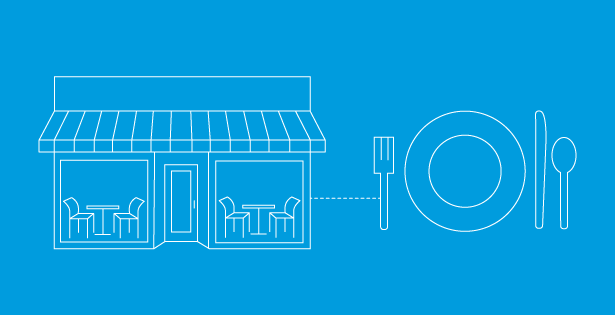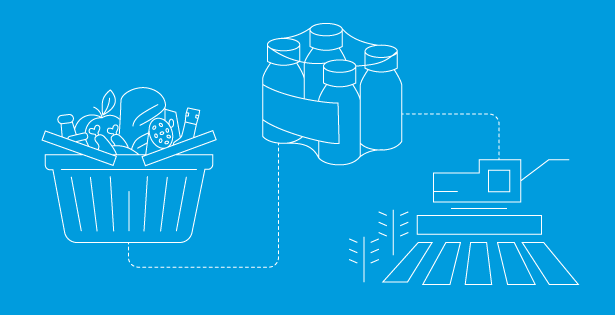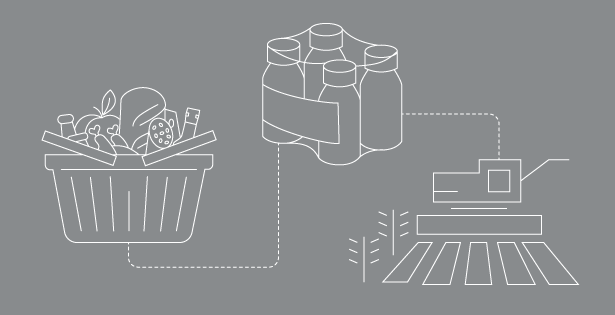What the ruling is:
The FDA recently released their new FSMA (Food Safety Modernization Act) ruling for traceability (section 204(d), this ruling and the new regulations associated with it will take effect Tuesday, January 20, 2026. This gives food and beverage companies three years to get their systems updated and ready for the changes to not risk any consequences.
The ruling is broken down into Critical Tracking Events (CTEs), when Key Data Elements (KDEs) will be captured. The KDEs will vary based on the CTE in the process. Below is the list of commodities that will be impacted.
| Commodity | Definition |
| Cheeses, other than hard cheeses, specifically: |
|
| Shell eggs |
|
| Nut butters |
|
| Cucumbers (fresh) |
|
| Herbs (fresh) |
|
| Leafy greens (fresh) |
|
| Melons (fresh) |
|
| Peppers (fresh) |
|
| Sprouts (fresh) |
|
| Tomatoes (fresh) |
|
| Tropical tree fruits (fresh) |
|
| Fruits (fresh-cut) |
|
| Vegetables other than leafy greens (fresh-cut) |
|
| Finfish (fresh and frozen) |
|
For reference see reference section
When producing any of the commodities found in the list above the KDEs will need to be documented for the different CTEs. Below is a chart outlining the different points in the supply chain that the traceability ruling will impact.
| Critical Tracking Event (CTE) | Harvesting | Cooling | Initial Packing | First Land-Based Receiver | Shipping | Receiving | Transformation |
| Description | Applies to farms and farms mixed-type facilities. | Active temperature reduction of raw agriculture commodity (RAC) | Packing raw agriculture commodity (RAC), other than food from a fish vessel for the first time | The person is taking possession of food from a fishing vessel for the first time | Food is transported from one location to another. This does NOT include sale or donation shipping | When food is received by someone other then a consumer after being transported. | When food goes through manufacturing. Does not include initial packing. |
For reference see reference section
For commodities that fall under this new ruling companies will also need to assign uniquely identifiable traceability lot codes (TLC). After the lot codes are added, the critical tracking events must include the traceability lot code. All key data elements will be linked to the traceability lot code for the commodity.
How the ruling impacts each Critical Tracking Events (CTEs):
For reference see reference section
For each critical tracking event different key data elements (KDEs) will need to be obtained. Below are the required KDEs for each CTE.
| Harvesting- Raw agricultural commodities (RACs) not obtained from fishing vessel. |
|
For produce:
|
For aquaculture food:
|
The initial packer must be provided the business name, phone number, and harvesting KDEs (except the reference document type and reference document number).
| Cooling- Raw agricultural commodities (RACs) not obtained from fishing vessel. |
|
The initial packer must be provided the cooling KDEs (except the reference document type and reference document number).
| Initial Packing- Raw agricultural commodities (RACs) not obtained from fishing vessel.
KDE’s must be linked to the traceability lot asked for the food that is packed |
|
For produce:
|
For aquaculture food:
|
For the commodity sprouts there are additional requires needed see references sections for more details
| Initial Packing- Raw agricultural commodities (RACs) not obtained from fishing vessel.
For food received from a person who is exempt from the rule |
|
| First Land-Based Receiver- Food obtained from a fishing vessel
KDEs must be linked to the traceability lot for the food |
|
| Shipping – (need to be maintained and provided)
KDEs must be linked to the traceability lot for the food |
|
This does not apply to the shipment of a good that occurs before the food is initially packed (not obtained from a fishing vessel).
|
Receiving KDE’s must be linked to the traceability lot for the food |
|
| For foods that are not exempt | For food that are exempt |
|
|
This does not apply to the shipment of a good that occurs before the food is initially packed (not obtained from a fishing vessel).
| Transformation-
KDEs must be linked to the new traceability lot for the food |
|
| FTL foods used as ingredient(s) | New food produced |
|
|
- For RACs that were not initially packed prior to the transformation of food must maintain records
- For sprouts that were not initially packed prior to transformations much maintain records.
- This does not apply to retail food establishments and restaurant with respect to foods they do not ship.
Additional Requirements:
If the company is required to follow the new traceability ruling, you must establish and maintain a traceability plan with the following information:
- A description of your companies’ procedures used to maintain records that are required to be maintained under the rule. Format and locations are required.
- A description of your companies’ procedures to list the foods that fall under the rule. Detail out foods your manufacture, process, pack, or hold.
- A description of how the traceability lot codes will be assigned.
- A statement identifying someone to contract for questions regarding plan.
- For growers (other than eggs) a farm map must be provided showing the areas the food is raised/grown
- Farm maps must show location and name of fields (or other growing areas). Geographic coordinated and other identifying information must be provided.
-
- Aquaculture farms must make location and name of containers. Geographic coordinates and other identifying information must be provided.
Additional requirements for any company that fall under the new rule include. Records must be either paper, electronic, or true copies. Records must be made available within 24 hours after the FDA makes a request. Unless exempt, an electronic sortable spreadsheet must be provided within 24 hours within a request from the FDA to assist with outbreak, recall or other threats to public health.
Visual Examples of the Ruling
Below is a visual of how this ruling will impact the process of growing, repacking, shipping, and selling tomatoes.
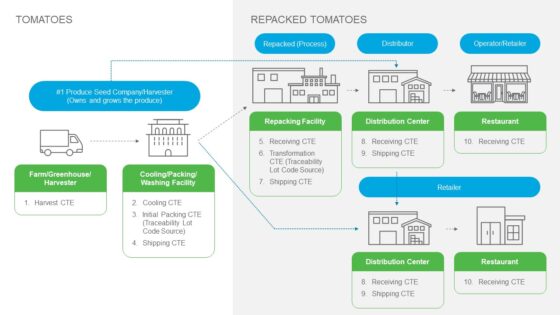
Below is a visual example of how this ruling will impact the production of peanut butter and products made from peanut butter.
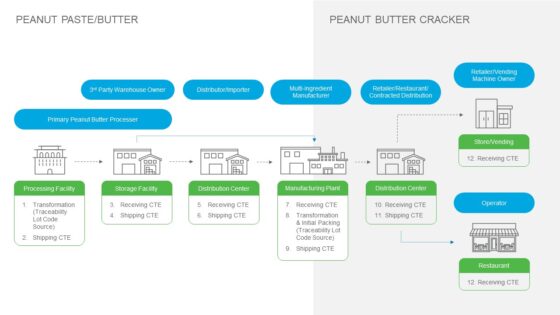
D365 Finance & Supply Chain Offering
RSM’s traceability accelerator within D365 Finance and Supply Chain (F&SC) uses forward and backward trace from transactions with options from a wizard interface to build the trace. Users can generate a recall report, save searches, and block inventory found in the trace.
RSM is constantly making changes to our accelerators to stay up to date on FDA changes and requirements, as a result there are plans to incorporate functionalities in the platform that will help achieve compliance with this ruling.
References
1: https://www.fda.gov/food/food-safety-modernization-act-fsma/food-traceability-list
3: https://www.fda.gov/media/163132/download
4: Sprouts additional requirements:
- Location description for the grower of seeds for sprouting and seed harvesting if either is available
- Location description for the seed conditioner or processor associated seed lot code, and date of conditioning or processing
- Locations description for the seed packinghouse (including any re-packers), date of packing, and any associated seed lot code assigned by the seed packinghouse
- Location description for the seed supplier, any seed lot code assigned by the seed supplier and any new seed lot code assigned by the sprouted
- Description of the seeds, (seed type or taxonomic name, growing specifications, type of packing, and antimicrobial treatment)
- Date of receipt of the receipts by the sprouted
- Reference document type and reference document number

 RSMUS.com
RSMUS.com